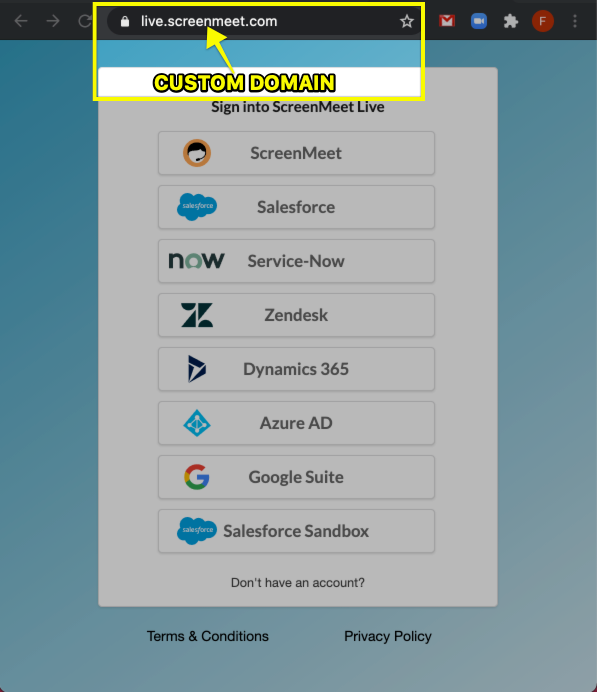ScreenMeet has the ability to customize the domain that is shown during a given ScreenMeet Live session.

There are a two options available in order to setup a custom domain:
1) Using a URL with a custom subdomain and screenmeet.com top-level-domain.
With this approach, we could use URL's such as <custom>.screenmeet.com - eg, customdomain.screenmeet.com
This option is the easiest and would require no additional effort from you.
This is an additional, optional ScreenMeet service that is offered. Please contact us at support@screenmeet.com for pricing and to setup your custom domain.
2) Using a fully custom URL
With this approach, we could use any URL. eg: meet.customdomain.com or similar.
There are a few possible technical implementation paths here:
- Your organization could set up a proxy at a URL of their choice and use https://live.screenmeet.com as the origin. Proxy should be configured to forward querystrings / headers / etc with one important exception for the host header. The host header should be hard-coded to live.screenmeet.com.
- Your organization could set up DNS CNAME entries to point at a CDN end-point provided by screenmeet. In this case, we would also have to set up an SSL certificate, for which we also have several options:
- ScreenMeet could use AWS ACM to provision the SSL certificate for the desired hostname (eg, meet.customdomain.com). In this case, there would be a total of 2 CNAME entries required, one for the actual hostname, and another for SSL certificate validation, which would look something like this: _a79865eb4cd1a6ab990a457
79b4e0b96.customdomain.com . With this approach, ScreenMeet could manage renewals of this certificate automatically as it expires annually / bi-annually. If someone were to click the certificate info in their browser it would show that the certificate is issued by Amazon. - Your organization could provide an SSL certificate they provision themselves to ScreenMeet, which we could import into our CDN. This would require bi-annual maintenance/updates as all SSL certificates have a maximum lifetime of 2 years.
- ScreenMeet could use AWS ACM to provision the SSL certificate for the desired hostname (eg, meet.customdomain.com). In this case, there would be a total of 2 CNAME entries required, one for the actual hostname, and another for SSL certificate validation, which would look something like this: _a79865eb4cd1a6ab990a457